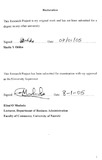| dc.description.abstract | International Business involves doing business with geographically
separated businesses. It has been in existence for a long time and the ways
to go about it is of interest to countries as well as individuals. Previously,
potential entrepreneurs have engaged in it through exporting, franchising,
direct selling and so on. With these modes of engagement, those involved in
business have experienced various challenges. With the advent of new
concepts such as E-business, the focus has had to change. E-business
encompasses the use of the Internet. The Internet may be considered to be
border-less hence it is very applicable in international business as it bridges
the gap i.e., the geographical separation. Anyone with access to a computer,
which is connected to the Internet, can communicate with a potential
business partner or a resource person as long as they are on the 'net'. This
study therefore sought to determine the extent to which E business is
adopted by firms in the handicraft sector to engage ill international business
by focusing on The Kenya National Handloom, Weavers Association.
Two objectives were pursued. These were:
a) To examine the extent to which e-business IS being applied III
promoting Kenyan products in the international market
b) To identify how E-business has enabled handicraft business sector to
do business internationally and make their mark in global sphere
Primary data was collected through a semi-structured questionnaire, which
was administered to a census population of twenty-six firms. The data was
analyzed using descriptive statistics including proportions, percentages and
tabulations.
The niche sector of handloom weavers represents just a small portion of the
handicraft sector and forms part of the larger small-business sector in
general. The findings in this study reveal an overwhelming interest in using
the Internet. Electronic mail or e-mail is the more common component of
the concept. It was used for identifying markets as depicted by 57.1 % of the
respondents who were using it for communication purposes while
identifying potential markets. All the respondents felt that the Internet could
be successfully used with the other modes of market entry and eventually it
should be fully incorporated as the single mode of entry. Thus there is need
for further research to be done ill further enhancing the use of this mode.
The literacy level in terms of Internet and ICT in general, needs to be
addressed. Thus the Internet should not only be limited to gaining entry into
markets and for communication purposes but for other business support
processes in the international business sphere such as distribution. A
number of businesses would likely spring up in the rural areas in Kenya
partly due to the fact that some of the raw materials used in this industry are
readily available in rural Kenya. The Internet should thus be extended to
rural' Kenya, which will have the dual advantage of marketing raw materials
and handicraft wares in addition to opening up this part of Kenya to the rest
of the world | en |

